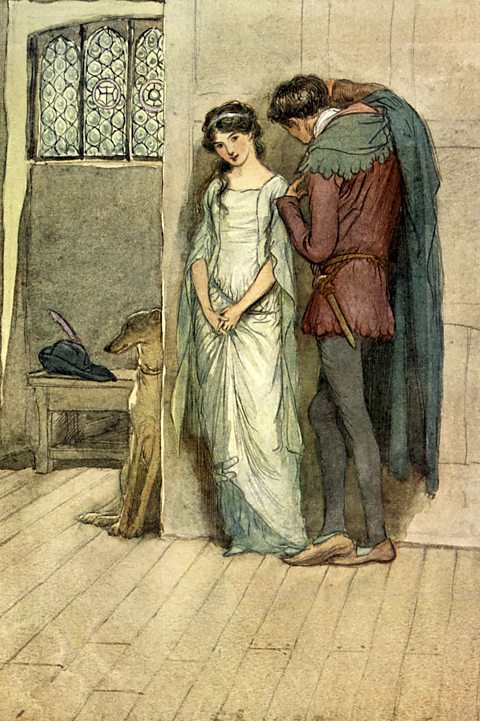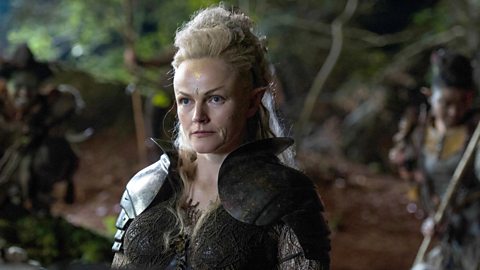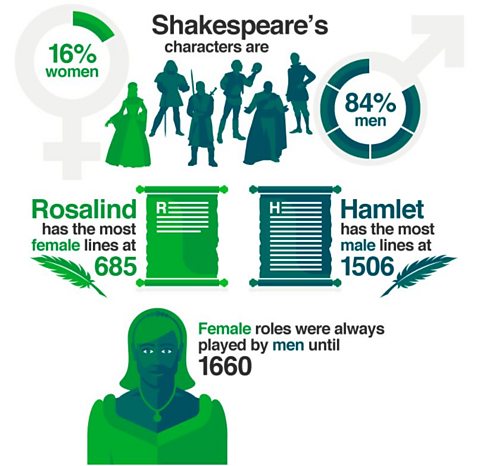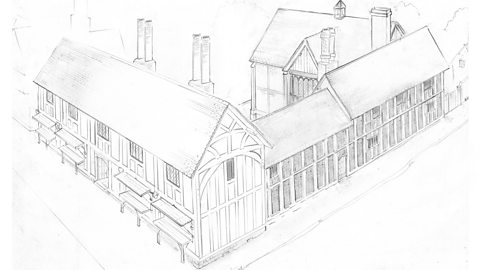Sigh no more, ladies, sigh no more
There are around seven times more male than female roles in Shakespeare's plays β a huge disparity between the sexes in speaking parts.
Although they are lacking in numbers and are sometimes accused of being archetypal, Shakespeare's female characters often show displays of courage, intelligence, ambition, recklessness and pride.
So in an age when women were not considered equals, did Shakespeare speak up for women β or is it all much ado about nothing?
WATCH: Understanding femininity
Eleanor Matsuura considers whether Shakespeare's female roles are substantial enough, and talks about her own experience of playing Hippolyta in A Midsummer Night's Dream.

Shakespeare in love
Shakespeare depicts equal relationships between men and women in some of his plays. But was this a reflection on his personal life?
Mary Arden had lost two daughters before William was born, and the boy was the apple of his motherβs eye.
Mary would have taught her son to read, delighting him with stories and sparking his imagination.
The second best bed
His marriage to Anne Hathaway is presumed to have been a shotgun wedding β they married in 1582 while she was pregnant with their first child. For most of their married life, Shakespeare lived in London, writing and performing while Anne remained in Stratford.
When he retired from the theatre in 1613, he chose to return to his wife rather than stay in London. In his will, Shakespeare left Anne his "second best bed". This is widely thought to be a slight but, in fact, the second best bed in most households was the marital bed β a rather touching object to leave for his widow.
There is no evidence to suggest Shakespeare disliked the women in his life, but some believe he had extra-marital affairs. In Sonnets 127-154, he refers to a passionate relationship with a "Dark Lady". Some historians have identified her as Emilia Lanier, a progressive poet who wrote about women's sexual liberation.
Perhaps she, along with his mother and wife, helped shape Shakespeare into a progressive, forward-thinking man β if not by today's standards then at least for his time.

And though she be but little, she is fierce
Shakespeare created a number of vivid, independent and free-thinking female characters in his plays. Are his ladies the ultimate girl power group? Click through our gallery to uncover their stories.

Image caption, Queen Titania rules the roost in A Midsummer Nightβs Dream. Her ethereal grace is matched by her power. Many great actors have revelled in her enchanting nature, including Judi Dench and Maxine Peake (pictured) in the ΒιΆΉΤΌΕΔβs 2016 adaptation.
1 of 9
How are women represented in Shakespeare?
King Charles II's decree in 1660 declared that "all the womenβs parts to be acted in either of the said two companies may be performed by women", giving patents to two theatre companies to allow women to act. That same year, the first woman on a public stage played the part of Desdemona in Othello.

Learn more about this topic:
How has Shakespeare influenced us? document
A 60-second animation that examines how the words Shakespeare used, and the films based on his work, continue to influence us today.

A day in the life of William Shakespeare. document
A timeline showing an imagined day in the life of William Shakespeare in Stratford-upon-Avon circa 1604. Made in association with the Shakespeare Birthplace Trust.

How can I learn to love Shakespeare? document
Russell T Davies and the cast of A Midsummer Nights Dream on the challenges of adapting Shakespeare and the value of letting the Bard into your life.
